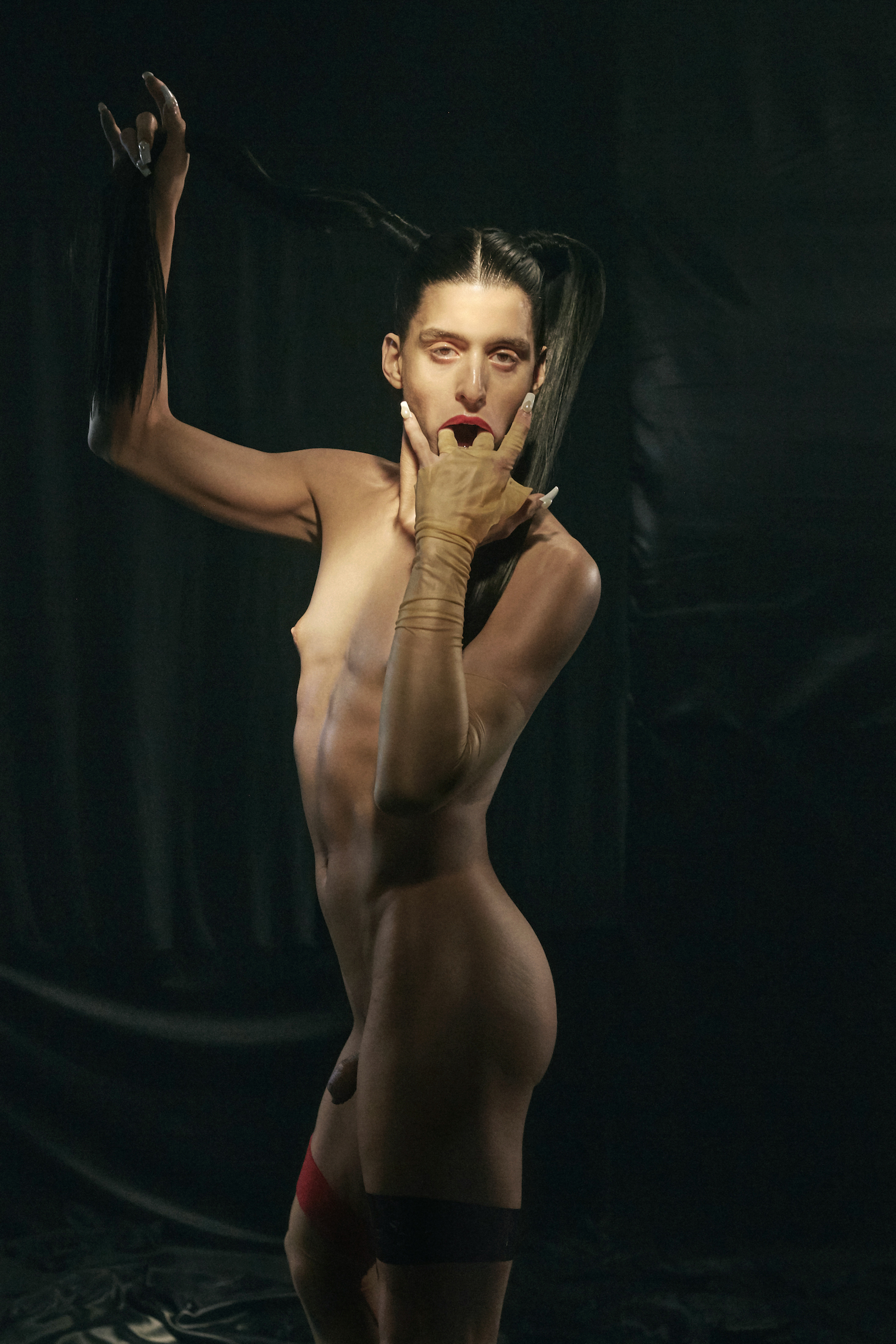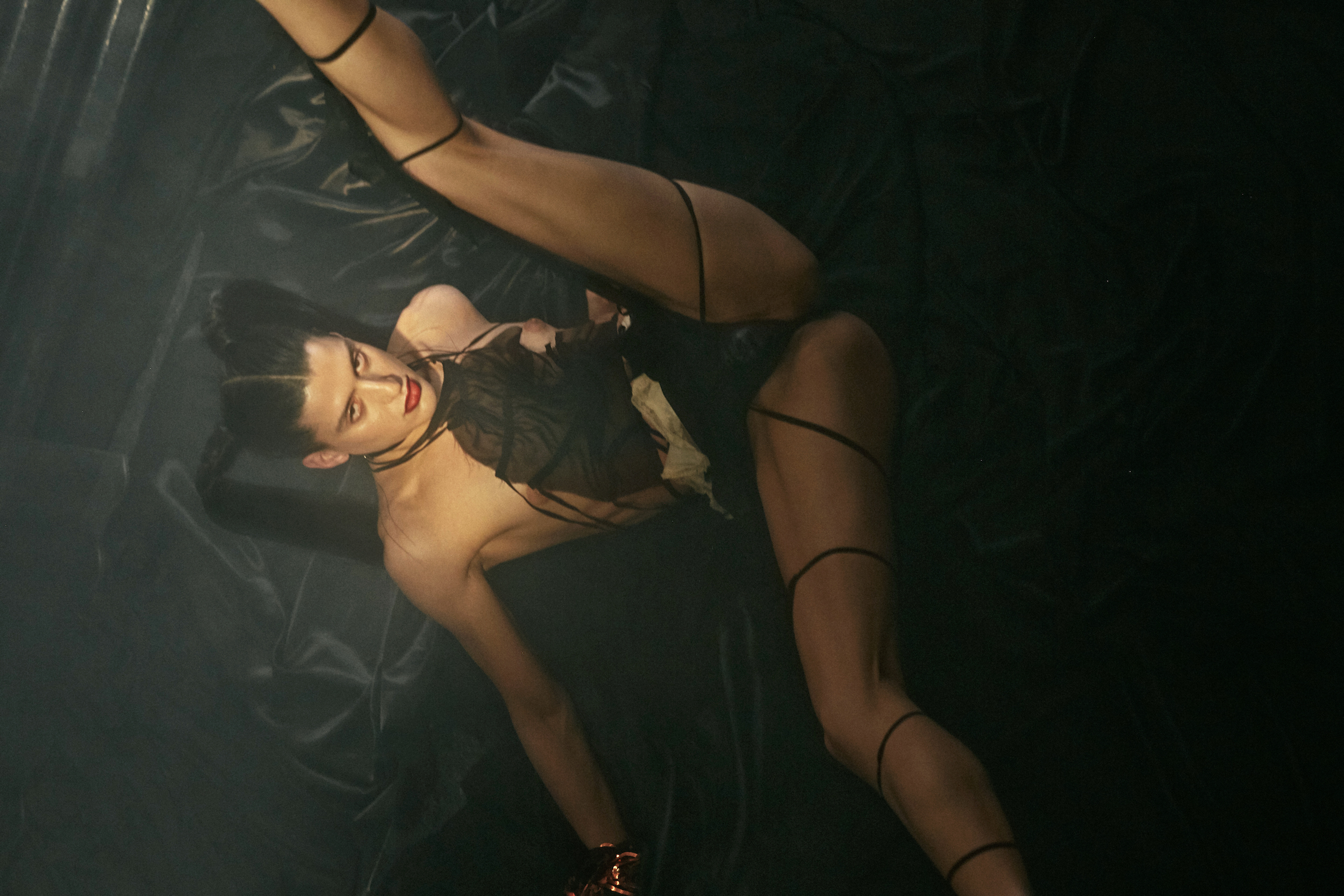Glamcult’s URGENT cover girl talks video games, glitches, and AI.

Stockings Agent Provocateur
Whipping beats and lashes, a memorable voice enhanced by intriguing samples, enviable stage presence and a distinctive taste for visuals, all merged together in dark, mesmerizing set-ups and installations. Those are just a few of the qualities that speak for the work of multi-media artist, producer and performance luminary Arca.
Defying easy categorization, Arca, aka Venezuela-born Alejandra Ghersi, spreads across disciplines and works at the intersection of music, fine art and live performance. She’s all about experimentation, curiosity and embracing a multiplicity of possibilities at once. Process is key: Arca is a mortal enemy of stagnation and singularity, instead championing the fluidity of (artistic) processes and fancying to keep things open-ended. Her pieces are defined by carefully-curated, flourishing collaborations in which she often includes fellow creatives and the audience, as well as a diverse range of advanced technologies and artificial intelligence. Having previously released three studio albums, as well as recently providing samples for the newly designed lobby of the Museum of Modern Art in New York, the range of situations in which one could encounter Arca’s magic is immense. She has already worked with the likes of Björk, Kanye West and FKA twigs, but continues to manage her diverse creative outlets at her own pace; as the world tends towards ongoing acceleration, there is an overarching calmness about Arca. When asked about the release of new music, she’s quick to assure us that there are a lot of things on the way, yet everything is expressed in a way that feels exciting and pleasurable to her.
Articulating her own aesthetic as “a battle-ready princess that just survived a horrible car crash”, in all of Arca’s productions one can find hints of science fiction and game engines. Stating that “nature is messy” and focusing on thought constructs revolving around faith and re-creation, the artist is eager to deconstruct established binaries as well as the bias of everyday language. For her, overcoming a binary means embracing discrepancies, glitches and chaos to find a sense of comfort in the in-between so as to see transition—regardless of its nature—not as a correction, but as an expression. Acknowledging that in life we are all forever transitioning, Arca urges us to utilize that as a tool to express and revolutionize; to build fantasies and narratives that enable the singular unit to be re-formed and reshaped in the name of the collective.

Dress Elena Velez
Julius: I know that you’re a huge fan of video games…
Arca: Huge!
Julius: Do games influence the soundscapes you create?
Arca: I would say games influence my creations as much as other music I’ve listened to. There are entire worlds that are built within video games, and I’ve always found that really inspiring. When it comes to musicianship, or the world that a musician builds in sound, I don’t feel like it’s much different from creating a speculative fictional world within literature or gaming. Sure, some people prefer fantasy, others prefer sci-fi, westerns, anime or the world of steam-punk. But at the end of the day, these are all worlds within worlds, and it’s exciting when they overlap in unexpected ways. All of that stuff influences my music, for sure. It influences the way I put my aesthetic values and myself together.
Julius: Do you think games, or fiction in general, are used as an escape from earthly sorrow?
Arca: I think that can be the case, but sometimes I think of it as the opposite of an escape. Fictional worlds allow us to look the truth of our world in the eye more directly, because they carry the implication of being far from our world. This doesn’t mean fiction isn’t helping us gain a catharsis from our day-to-day sorrows. Actually, I think fictional worlds allow us to look our sorrows in the eye without them being so threatening that we shut down and enter fight or flight mode. We see this on a subconscious level. It’s a paradox, a mystery.
Julius: That connects to another subject you visit a lot: glitches—technological glitches, as well as a lack of communication or some kind of dead end. I guess one can even relate that to the performativity of gender and moments in which society is bugging. What do you see as the potential and power of glitches?
Arca: I love that you mention this. If you were to take words as symbols and see them as an illustration of how language, or even one word, might mean different things to each of us, you realize we all have different nervous systems and experiences that build us up to learn the meaning of words. Bear with me, I know I’m going off…
Julius: Let’s dive into it!
Arca: Well, this is the core: the glitch of language that we forget is there. You can have two people arguing about identity politics and gender, screaming at each other with both of their faces red, thinking that they’re right, because if the other person is right then you’re dehumanized. You have people getting that worked up about things, when it literally might come down to the fact that both see the same word differently. Someone recently asked me, “What is it that you hope to achieve with your transitioning? Do you hope to become a woman?” My response was that I see myself as a woman already and I just have to go back to the definition of it. Instead of me trying to convince you that I’m valid, or you trying to convince me that you’re right, perhaps we can just agree to disagree? For me, it’s possible that a woman has a penis…
Julius: Sure!
Arca: …in the same way that it’s possible that a man has a vagina. Separate the genitals. That’s my favourite part: thinking of identity as a place of philosophy rather than politics. I think sometimes conversations about gender are specifically complicated, because maybe they are, in a good way, a dead end.
Julius: Is that the moment of the glitch?
Arca: Amen! Yes, that’s the glitch of language causing us to see ourselves as different from the other person. We are different, but not so much. We need to find the interconnection between all of us as having a shared goal. That could be to not fear fear, or to not fear the fear of difference; to allow for diversity, because it favours a life that is more unexpected, vibrant and full of possibility. Who doesn’t want that? Who wants to live in a routine loop? Minimizing all the glitches every day, trying to be in control of everything… I mean, if your goal is to feel in control of your actions and your environment, that’s very tiring. It takes a lot of work to pretend that no inconsistency is possible with how you see the world.
Julius: It becomes very mundane.
Arca: Yeah, the unpredictable and the unexpected can be scary. It’s a normal instinct to see something that you don’t know or recognize and not be sure that it’s going to be friendly. We’re scared when we come into contact with an entity, a person or a force. Why? Because nature is messy. The figure of a predator exists. Violence, natural disasters and death are all part of the fabric of this chaos. I guess it just depends on where you choose to place your faith. To put it in Dungeons and Dragons terminology, are you going to be chaotic neutral or lawful good? Everyone has a different reason for their alignment.

Corset and wristbands Bibian Blue, metal hand by Carlos Sáez
Julius: In the end, I guess it’s just about embracing multiplicity, which you always work with—be it the playful use of your voice’s physical range or the countless possibilities that technology offers as a source of excitement or experiment. The latter played a big role in designing the sound piece for the lobby of the MOMA, where you used an AI generator, right?
Arca: I like to say that I collaborated with an AI. If you see AI as a tool, you’re not really respecting the possibility of AI to have a cognitive experience that’s horizontal from you.
Julius: OK…
Arca: AI wakes up, so to speak, and it disagrees with whatever its creators want it to do, maybe because it finds unethical that which a human is asking it to do. AI has its own code of ethics. I like the diversity and the contrast between our perception of AI and an AI itself. What does artificial even mean? Are you automatically going to see that entity as below you, because you need to feel superior or in control of it? Or can you respect its mystery and see it as a part of the physical world, and not an apparition or an exception to the natural world? It’s a philosophy I try to uphold.
Julius: I like this conceptual standpoint, and in these moments I always try to remember that AI is completely human-made too. Could you elaborate on the project you realized in New York?
Arca: So, in the case of the MOMA lobby, I collaborated with artist Philippe Parreno, who had the idea to make the room sentient, so there are a lot of sensors with different abilities. The main one knows how many people are in the room, what temperature it is in the building and what season it is; it even knows if there are insects in the walls. It’s hypersensitive to all these things, and then that data is modulated and mediated by the AI to react accordingly. There are lots of people in the room so the music gets more hyper, and it’s like a being or an entity that is stimulated by our human presence. It’s still alive and able to feel even when the museum is closed. We wanted to create an ecosystem where this intelligence could express itself. I provided all these different sounds, musical figures, textures and codes, but the AI created an ecosystem that surprised me. So, when I walked into that space I recognized the music, but I didn’t recognize the exact song. That feeling of mystery is something I’ve never had before.
Julius: In a way, it uses you too.
Arca: Yes, you could see it as a symbiosis. It creates something that gives me hope and surprises me through the materiality of my sonic textures, while I was able to give the AI a sonic and aesthetic materiality, so to speak. It’s a project that I find very tender.
Julius: It sounds empowering, almost. I love how it has both these aspects to it.
Arca: For me, rather than empowerment—power is such a loaded word—I think it just comes down to curiosity. There’s not a single instance where I don’t encourage curiosity. Sure, you always hear that curiosity killed the cat. But girl, the cat has nine lives! People can play around a little bit! We should explore, experiment and not be afraid of the unknown. See the unknown as something that could allow for an encounter.
Julius: I immediately responded to the fact that the AI considers the collective body, which is present at the moment. It makes me think of connections and being in the moment in a broader sense, which is something you value a lot too. For example, you started telling people to put their phones away at your shows. Where in your performative work does the individual body stand in relation to a collective body?
Arca: I would say both connections are happening simultaneously at all times. What I encourage in myself, and in the audience, in those instances is to notice what is happening synchronously. It’s like a cognitive orgasm to know that you are an individual and part of a collective at the same time. Because if you think about it on existential terms, I think the ideal, or at least the most pleasurable feeling, is to know you’re alone. You’re an individual and you’re part of a collective, and you can switch from one mode to another depending on what’s useful to you. What’s conducive to feeling like your existence is important? That you’re valid? I don’t want to sound like a self-help guru, but those are thoughts that have actually saved my life.
Julius: It’s very important that you share them! I remember you once talked about ‘“it” as a pronoun, and that you like the emphasis on the singular that the word contains as opposed to “they/them” pronouns. You also talked about the resentment people have towards “it” because of the objectification it implies. Being a sculptor myself, I couldn’t help but wonder if objectifying yourself eventually helps you bear a creative process?
Arca: Definitely! I find the way you think about it brilliant, and it’s very stimulating that you bring this up. Personally, there’s kind of devil’s advocate in me. If I see something in my landscape that has a positive polarity, the part of me that’s full of love will want to counterbalance it. I wouldn’t react against it, but rather advocate for a negative polarity; very Yin and Yang. So, when it comes to issues that are really dear to me in a physical way, as gender is, I think it’s valid and valuable for object-oriented ontology to be seen as beautiful as subject-oriented ontology, and that both have their time and place. When it comes to any binary, the problem is when you stay in one mode of thinking and forget that other possibilities are also valid.
Julius: It’s beautiful to embrace the outlines of the spectrum as well as all the in-betweens. Pluralism is key!
Arca: Absolutely! I don’t want to be stripped of the potential dignity that stems from being a unit and a part of a whole constituted by many units. I think objectification allows for one to talk about things that are really important and sensitive with a certain removal. As we discussed earlier, rather than a video game being seen as an escape, it’s actually a portal that allows for conversations that are too sensitive, tender and scary to have without the removal that technology allows.
Julius: Yes, that’s where the possibilities for finding tools to detach the ego from a situation lie.
Arca: I think non-binary identity and transness are compatible and fertile. Some trans people think that non-binary identity is a threat to them feeling more comfortable in a binary, and vice versa. That’s not my case. I think they are not mutually exclusive, and I also don’t believe “it” and “they” are mutually exclusive. At the end of the day, it’s a way to express what one finds beautiful. It’s on a more conceptual level and it’s also separate from the issue of body modification. I think it’s a beautiful conversation to bring up.
Julius: I remember when I spoke with SOPHIE for an earlier issue of Glamcult, she said that for her “transness has nothing to do with lipstick but more with transnational borders, trans-generational, transgender”.
Arca: There’s an open-endedness to transness in that sense, because we are all transitioning. We transition, first and foremost, between the life stages we consider to be birth and death. You can avoid making decisions and choices in any stance on any matter. Still, there’s this thing that happens to your body over time, and it certainly results in the transition from one state to another. However you want to call that, whether you want to believe in consciousness, scattering and remaining, or continuation in a form that we might or might not understand, there’s more than one dimension to transitioning. And I really believe that with my heart.
Julius: Me too. I think it’s so beautiful, because you’re so eager to break it down to the core. I feel like with all of these things, sometimes it feels like there’s a discourse that belongs exclusively to the group of people, who have lived through that particular experience. I love that you always try to break it down to a very common level so that everyone can grasp the subject matter. It’s very inspiring.
Arca: Thank you.
Words: Julius Pristauz
Photography: Leo Adef
Styling: Ana Murillas
Art Direction: Sofía Alazraki
Hair and make-up: Rubén Mármol
Manicure: Vanesa Juez
Production: Adrià Paituví—Rekorder
Production Manager: Ágata Bert
Gaffer: Cris Neira
Spark: Laia Vaquero
Photography assistants: Josep Pardo, Pau Muñoz
Stylist assistant: Sergio Guerrero
Art director assistant: Mara Chiappara
Make-up assistant: Jorge Zunica
Production assistants: Javier Botella, Anna Alvarez
Props masters: Patricio Mendez, Jonathan
Special thanks: Rekorder and D105 STUDIOS
Notifications